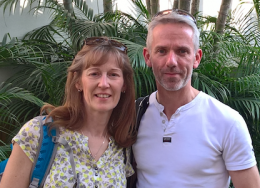But the noble make noble plans, and by noble deeds they stand (Isaiah 32:8)
 Introduction
Introduction
The local church is frequently undergoing change, yet the skills needed to carry out these changes do not come into the normal training packages of leaders in the Newfrontiers family. With this in mind I invited Gary Borland to write a series for me (see below for Gary’s background). Gary, who has extensive experience in this area, has been a key player in helping Guy Miller and his team to define the vision, strategy, and implementation for the Commission sphere of churches, a process that is now agreed and well underway.
‘Gary has opened our eyes to the process and skills required to manage change effectively as he has helped us to clarify and articulate our vision, develop strategy and agree a process of implementation, with the vital place of regular communication to the churches in Commission and the enrolment of key folk as we have proceeded’. Guy Miller
The purpose of this series is to provide an overview of Change Management and the leadership requirements needed to create and deliver transformational breakthrough. I suggest you work through the material thoughtfully, prayerfully and with a commitment to learn, listening carefully to the Holy Spirit. Embracing what Gary teaches will transform the way you do things to the benefit of your church or sphere, and for the advancement of the Kingdom.
Change and Transformation – do they differ?
The bewildering array of ‘change management’ books, online resources, conferences and other material can either be used to equip leaders and teams to undertake effective change management, or at the other end of the spectrum, contribute to poorly conceived and led programmes.
Commonly understood and consistent language is at best elusive. What constitutes “change” and “transformation” falls firmly into this category. The two are not the same and unless leaders understand this, they will set off on a path that’s likely to resign their transformation programme to mediocrity or total failure. Consistent research shows that 70% of others fail to deliver their intended outcomes and benefits.
Excellent though the capabilities and models may be of consultancy firms who offer to manage your “Change” or “Transformation” programmes, the reality is that it can be a short step and some very large sums of money to total dependency. If the fundamental building blocks never permeate the breadth and depth of leadership, and senior leadership fail to own their own programme, then failure is just a matter of time!
Comfortable being uncomfortable
While individual initiatives require change management skills, leaders in transformation programmes need to learn broader capabilities, including increased flexibility, adaptability and strong collaboration across organisational boundaries. Excellent communication skills become imperative, and leaders need to quickly become ‘comfortable being uncomfortable’ and to create their own clarity in the inevitable, emerging fog of ambiguity.
“Change” is about implementing specific initiatives with a focus on creating clearly defined changes to, for example, working patterns and processes. “Transformation” on the other hand is fundamentally different and involves many interdependent and interlinked initiatives with the overall aim of recreating the organisation, whether church or apostolic sphere, to ensure it is capable of delivering a bold future vision.
Unsurprisingly, greater risk is involved in transformation and there are no comprehensive templates or blueprints as to how its either designed or executed, other than some processes, tools and principles that can be applied. Predictability may be absent, certain aspects may be tried, tested, failed, re-tried again, and with experimentation comes the always present danger of leadership disengagement. Transformation failure can be preceded by a number of successes – the old adage, you can win a lot of battles and still lose the war.
There is of course nothing new under the sun, but the permutations of factors such as leadership, people, resources, where you’re coming from and where you’re trying to get to are important elements of context that need to be understood.
Understand the context
So what is context? Context could be considered as the background against which any challenge and its goals are viewed and understood. However, context is often unquestioned or not apparent, and is often wrongly assumed to be shared by everyone, yet determines people’s view of what’s possible, and shapes actions and outcomes. Without a new and shared context for the challenge, people will continue to operate as they have in the past and wonder why nothing changes.
An important key to establish at the outset is where the organisation is today and the possibility you see for the future. Getting real about all aspects of an organisation, starting with leadership and particularly the overall leader, is vital if transformation has any realistic prospect of delivering on big visions and big possibilities.
Staring down the barrel of a 70% failure rate, a focus on leadership requirements would seem to be a fitting place for next week.
It is likely that as you read this series questions will come to mind since such a complex subject cannot be handled in full in one short series. Gary has agreed to receive queries and can be reached by clicking here.
Who is Gary Borland?
 Having taught military strategic campaign planning in the Royal Air Force and then led a number of major change and transformation programmes in his role as Managing Director of large complex businesses in a PLC, Gary has a breadth of experience to share. He is keen to point out that what he is sharing are his personal observations and reflections, and that there are many other ways of expressing and leading change and transformation, all of which should be weighed and considered.
Having taught military strategic campaign planning in the Royal Air Force and then led a number of major change and transformation programmes in his role as Managing Director of large complex businesses in a PLC, Gary has a breadth of experience to share. He is keen to point out that what he is sharing are his personal observations and reflections, and that there are many other ways of expressing and leading change and transformation, all of which should be weighed and considered.
